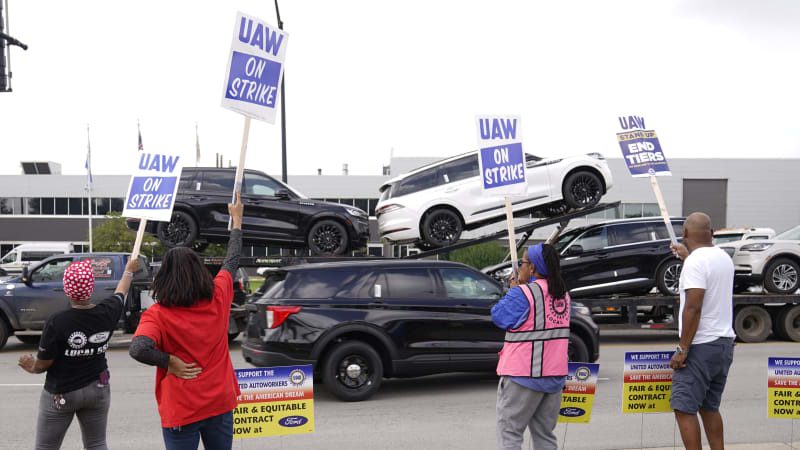UAW strike: Here's what analysts are saying about the latest development

A UAW picket line has gone up at Ford’s Chicago facility, one of two assembly plants added to the strike on Friday. (AP)
The United Auto Workers are walking off the job at an additional plant each at General Motors and Ford, but will spare Stellantis after last-minutes concessions by the Chrysler parent, union president Shawn Fain said on Friday.
Here are the reactions from close observers of the auto industry:
Arthur Wheaton, director of labor studies at Cornell’s School of Industrial and Labor Relations:
“The world is watching pretty closely, and so far, it’s still overwhelmingly on the side of the UAW.”
“What Shawn Fain wanted is a tit for tat: If you’re good for us at the table, we won’t mess with you. If you’re bad with us at the table, we will escalate the strike. So I think it’s having its desired effect.”
Sam Fiorani, VP of global vehicle forecasting at AutoForecast Solutions
“It shouldn’t affect volumes too much. It’s another warning to the OEMs, they haven’t hit the meat of the profits … these are popular vehicles, but [the targeted strike is] not really digging into the finances of these companies.”
“The strike costs the union a lot of money. It’s $500 per worker per week. With the additional 7,000 [workers at the two plants in today’s expansion] we are talking about over $12 million a week out of the strike fund.”
“If they were to take into the bigger vehicles, the fallout would be huge as they would spread across powertrain plants, stamping plants, everything else that would come down if they were to tackle the pickup trucks or full-size sport utilities.”
Daniel Ives, analyst at Wedbush Securities
“This UAW debacle strike trajectory is like watching a slow moving car crash take place on black ice in our view.”
“The UAW strike is now getting nastier with both sides digging in the trenches in what could be a long and drawn-out battle between the UAW and the Detroit auto stalwarts.”
“This is a defining period for Detroit and the future of the auto industry as we firmly believe that if GM, Ford, Stellantis accept anything close to the deal on the table the future will be very bleak for the U.S. auto industry.”
“If the Detroit Three took this current deal, we estimate the average EV vehicle will go up in price by $3K-$5K to pass these costs onto the consumer and would ultimately be a torpedo to the future business models of the 313 area code.”



